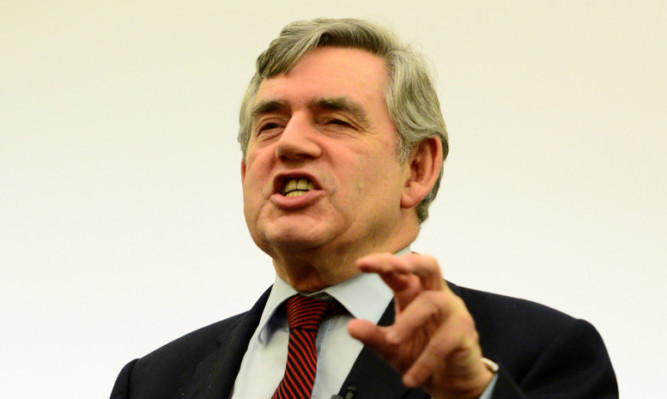Politicians must stop asking what Scotland can do for them but explain what they can do for Scotland, according to former prime minister Gordon Brown.
Mr Brown attacked the SNP for focusing on “the minutiae of Westminster insider politics like confidence and supply deals” with Labour ahead of the general election, rather than “the big issues that matter such as ending poverty, unemployment, inequality and injustice in Scotland”.
In one of his final speeches before stepping down as an MP, reminiscent of US President John F Kennedy’s 1961 inauguration address, Mr Brown urged Labour to ask “not what Scotland can do for Labour, but what Labour can do for Scotland”.
He added: “Even If the SNP seem happy to spend their time talking about hung parliaments, post-election deals and coalitions, we will spend our time talking about new Scottish jobs, new Scottish businesses and new Scottish technologies, and how we can benefit from leading a global economic revolution.
“While their speeches focus on the minutiae of Westminster insider politics – like ‘confidence and supply deals’ – we will talk about the big issues that matter such as ending poverty, unemployment, inequality and injustice in Scotland.
“The economic, social and constitutional revolution which Scotland must lead cannot be achieved by the present UK Government nor the present Scottish Government, who have together presided over a rise in poverty and inequality.”
He added: “I am conscious that even now, the general election media debate is already being focused not on the social and economic changes we need to bring about but on how political parties can secure an advantage for themselves.
“So people talk of what Scotland can do for Labour and what Scotland can do for the SNP, and thus these terms and conditions of cross-party deals.
“I say: people want social change and economic change in the way their lives are lived, and the question we will ask and answer is not what Scotland can do for Labour, but what Labour can do for Scotland.”
Speaking in the east end of Glasgow, he said Scots have been priced out of the housing market by rocketing house prices, forcing them into expensive private lets leading to over a third of private tenants living in poverty.
“In a manner reminiscent of Victorian times before the building of public sector housing, there will soon be as many poor households in the smaller private rented sector as in the larger social housing sector,” he said.
Mr Brown said his programme for change can unite “a Scotland divided by the referendum” and “repair the divisions that have since September embittered Scotland”.
Scots are seeking protection from “often bewildering and alien forces of change” in the world economy where the balance of wealth and income is shifting from the west to Asia, impacting on Scotland’s shipbuilding industry with so many ships built in Korea, Japan and China, he said.
The SNP’s plan to remain in the EU and keep the pound demonstrates their recognition that “independence is limited by our interdependence”, he said.
He accused the SNP of selling the “illusion” that constitutional change alone can fix Scotland’s problems.
“We need to pioneer a new constitutional model that is not the old independence, which forgets we are part of an interdependent world, and is not the old devolution, which does not achieve the right balance between Scottish autonomy and UK-wide sharing for today,” he said.
“It is instead something quite different – a modern equivalent of Scottish home rule within the UK.”
Mr Brown is also calling for the creation of a North Sea reserve fund to help the oil industry.
The fund would help maintain and upgrade infrastructure and could provide last-resort debt finance for companies who want to keep fields open, he said.
He believes the Government could even take over fields in partnership with some firms in order to keep them open and viable in future.
The Kirkcaldy and Cowdenbeath MP, who is stepping down from Westminster at May’s election, also wants to see young people encouraged to work in hi-tech medical, environmental and engineering jobs as traditional manufacturing work continues to decline.
